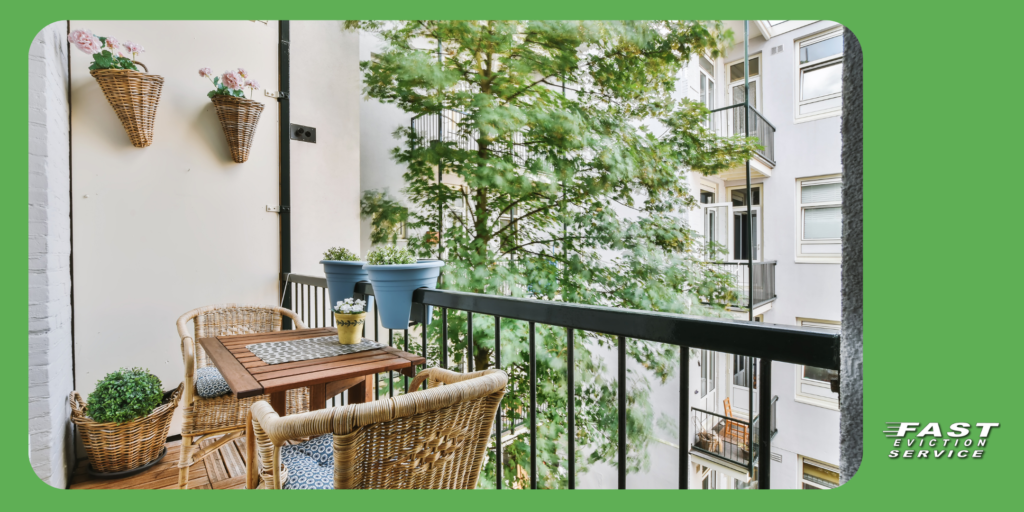Updated 12/06/24
Senate Bill 721 (SB 721), commonly referred to as California’s Balcony Inspection Law, was enacted in 2019 in response to safety concerns surrounding elevated exterior elements such as balconies, decks, and walkways in multifamily residential properties. The law aims to prevent tragic accidents caused by structural failures, emphasizing the importance of regular inspections and maintenance of these critical property components.

This legislation affects landlords and property managers across California, mandating periodic inspections and compliance measures to ensure the safety of tenants and guests. However, many property owners still lack clarity about the specifics of SB 721 compliance, including deadlines, processes, and best practices. This article explains SB 721 in detail and offers actionable advice for landlords looking to stay compliant.
Table of Contents
- What Does SB 721 Require?
- Key Deadlines for Compliance
- SB 721 Compliance: Understanding the Inspection Process
- Tips for Staying Compliant
- Frequently Asked Questions
What Does SB 721 Require?
At its core, SB 721 mandates the periodic inspection of balconies, decks, and other elevated exterior elements in multifamily residential properties. These inspections are designed to identify any signs of structural weakness, deterioration, or failure that could pose safety risks. Property owners must hire qualified inspectors to assess the condition of these elements and ensure they meet the structural integrity requirements outlined in the law.
Key highlights of SB 721:
- Applies to multifamily residential buildings with three or more units.
- Requires the inspection of elevated elements supported primarily by wood, such as balconies and walkways, that are more than six feet above the ground.
- Establishes a clear inspection schedule with mandatory deadlines.
The law aims to ensure landlords maintain their properties in a safe condition, thereby protecting tenants and reducing liability risks. Neglecting these inspections can result in penalties and potential legal consequences.
Key Deadlines for Compliance
The timeline for SB 721 compliance is structured to give property owners ample time to conduct inspections and make any necessary repairs.
- Initial Inspection Deadline
The first inspection of balconies and elevated elements must be completed by January 1, 2025. - Follow-Up Inspections
Subsequent inspections are required every six years. For properties inspected before the 2025 deadline, the next inspection is due by January 1, 2031.
By adhering to these deadlines, property owners can avoid penalties and ensure their buildings remain compliant with California law. Delaying inspections can lead to increased costs, particularly if repairs become urgent or if inspectors are in high demand as deadlines approach.
SB 721 Compliance: Understanding the Inspection Process
The inspection process involves several steps, each critical to meeting SB 721 requirements.
- Hiring a Qualified Inspector
Inspections must be performed by a licensed architect, civil or structural engineer, or general contractor with specific expertise in structural assessments. - Inspection Guidelines
Inspectors will evaluate the condition of wood-based structural components, checking for signs of decay, rot, or water damage. - Inspection Reports
After the inspection, the inspector will provide a detailed report with findings. Possible outcomes include:- Pass: No significant structural issues detected.
- Repair Required: Issues identified that must be addressed before the structure is deemed safe.
- Maintaining Records
Owners are required to keep inspection reports for two inspection cycles (approximately 12 years). These records demonstrate compliance and help track the condition of the building over time.
Tips for Staying Compliant
- Plan Ahead
Don’t wait until the last minute. Given ongoing challenges such as supply chain delays and labor shortages, early planning can help you secure qualified inspectors and contractors at competitive rates. - Separate Inspection and Repair Roles
While SB 607 amended the original law to allow contractors to perform both inspections and repairs, it’s advisable to use separate entities for these tasks. This avoids conflicts of interest and ensures the integrity of inspection findings. - Budget Proactively
Inspections and potential repairs can be costly. Start budgeting for these expenses early, especially if your property requires extensive work to meet compliance standards. - Focus on Safety
Even if your building is relatively new, structural failures can occur due to environmental factors or poor initial construction. Regular inspections help protect your tenants and minimize liability risks. - Maintain Open Communication
Keep tenants informed about upcoming inspections and any necessary repairs. Transparent communication fosters trust and ensures minimal disruption during the compliance process.
Frequently Asked Questions
1. What is the main purpose of SB 721?
The primary goal of SB 721 is to enhance tenant safety by requiring regular inspections of balconies, decks, and other elevated exterior elements in multifamily residential properties.
2. What happens if I miss the compliance deadline?
Failing to meet the January 1, 2025 deadline can result in penalties, fines, and increased liability exposure. It’s essential to plan and schedule inspections well before the deadline.
3. Can I use the same contractor for inspections and repairs?
Yes, SB 607 allows contractors to perform both tasks. However, for impartial results, it is recommended to hire separate entities for inspections and repairs. This ensures that inspection findings are unbiased and focused solely on safety concerns.
Final Thoughts
Understanding and complying with SB 721 is not just a legal obligation—it’s a vital step in safeguarding your tenants and protecting your property investment. By familiarizing yourself with the law’s requirements, planning early, and making informed decisions about inspections and repairs, you can ensure your properties remain safe, compliant, and well-maintained.
Landlords and property managers who take proactive steps to meet SB 721 compliance not only avoid legal risks but also demonstrate a commitment to tenant safety and responsible property management.





